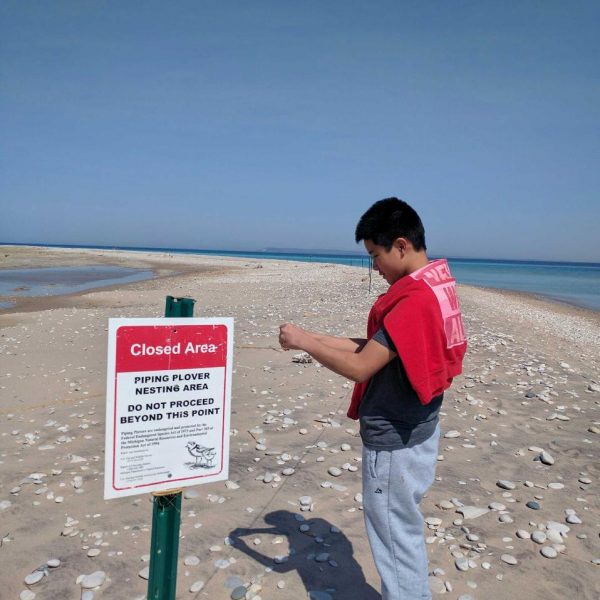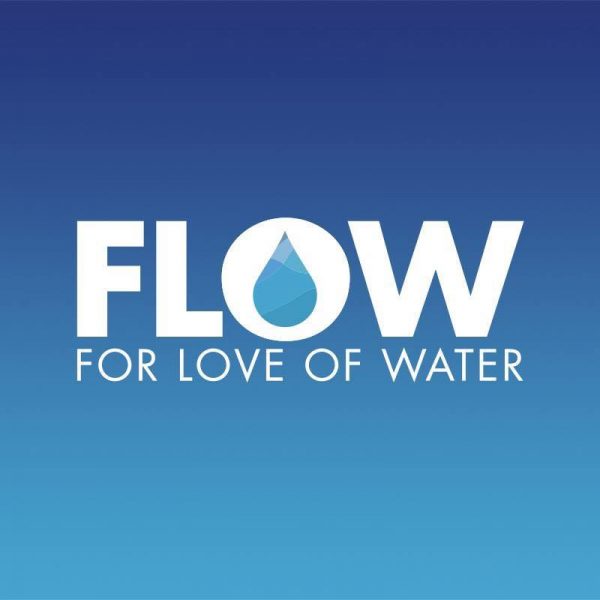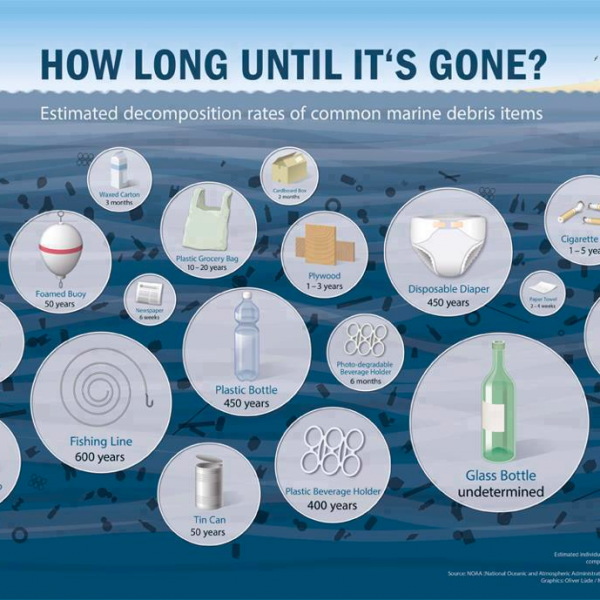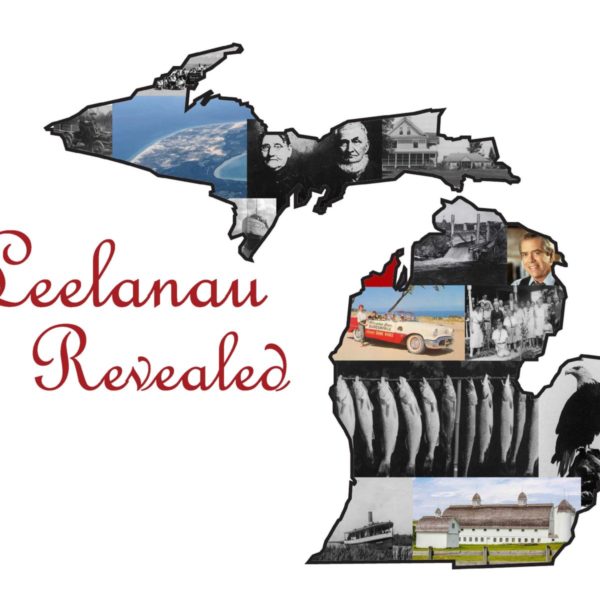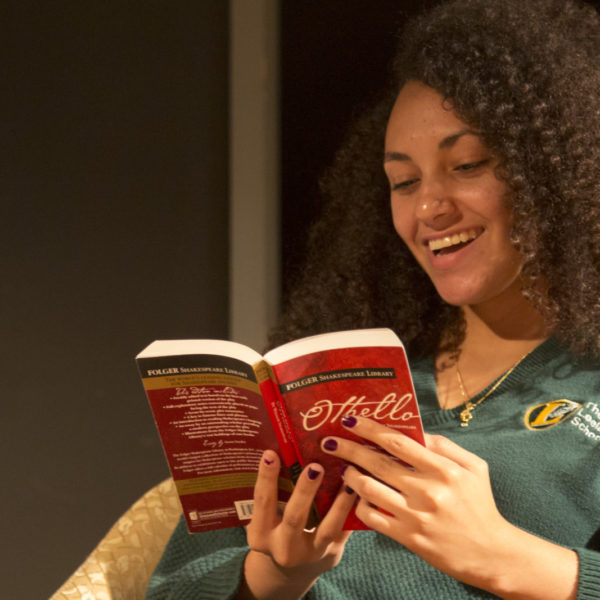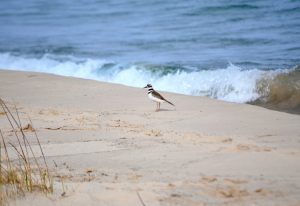 It’s not an everyday occurrence when someone is able to watch five members of an endangered species from a few feet away, but that is just what Leelanau students were able to do this spring. For the 17th year, Leelanau students in the Environmental Science and Chemistry classes worked with the National Park Service at the Sleeping Bear Dunes National Lakeshore to help protect the small population of Piping Plover, a small shorebird, whose Great Lakes population was placed on the Endangered Species List in 1986.
It’s not an everyday occurrence when someone is able to watch five members of an endangered species from a few feet away, but that is just what Leelanau students were able to do this spring. For the 17th year, Leelanau students in the Environmental Science and Chemistry classes worked with the National Park Service at the Sleeping Bear Dunes National Lakeshore to help protect the small population of Piping Plover, a small shorebird, whose Great Lakes population was placed on the Endangered Species List in 1986.
Students worked to install “Psychological Fencing” around the Piping Plover nesting areas. Psychological in that the fencing consists of signage, posts, and orange twine and can only protect the birds if people choose to keep themselves and their dogs out of the nesting areas, which is critical for population recovery.
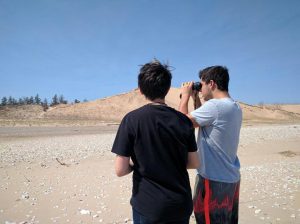 In the time Leelanau has been involved with the Piping Plover Project the Plover population has almost doubled from just fewer than 40 breeding pairs to nearly 80 last year! Some of the birds are nesting in different areas based on water levels, so fencing was placed in a new location this year – just down the road from the School in Historic Glen Haven.
In the time Leelanau has been involved with the Piping Plover Project the Plover population has almost doubled from just fewer than 40 breeding pairs to nearly 80 last year! Some of the birds are nesting in different areas based on water levels, so fencing was placed in a new location this year – just down the road from the School in Historic Glen Haven.
The opportunity for students to be so closely involved with an Endangered Species Program is a fantastic opportunity for experiential and service learning. To learn more about the Piping Plover or how to get involved with Endangered Species Recovery visit U. S. Fish and Wildlife.
Water is a natural resource that evokes an emotional almost visceral feeling in many people, especially those of us lucky enough to live so closely to the Great Lakes. Water is life, beauty, bounty, and livelihood.
Today, as the second part of our Environmental Speaker Series, we will host representatives from FLOW |For The Love of Water, a public trust policy and education center based in Traverse City, MI.
Liz Rosan Kirkwood, Executive Director and Kaitlyn Bunting, Intern, will present to Leelanau students and will allow for interesting and engaging conversation where students will learn about Great Lakes issues, threats, and opportunities to take action and will understand what is truly at stake. Liz and Kaitlyn will also show how humor can be used to illustrate environmental, economic, and social problems with privatizing water through video and FLOWs new campaign, Get Off The Bottle.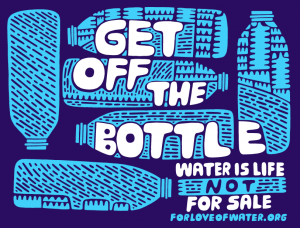
Students will have the opportunity to break into small groups to come up with a bottled water pledge, similar to Get Off the Bottle, including one actionable community item such as talking to a local business about getting rid of straws.
FLOW’s Mission: to protect the common waters of the Great Lakes Basin through public trust solutions. As the Great Lakes Basin’s only public trust policy and education center, we demonstrate how policies like the public trust and commons can provide an overarching policy framework that empowers decision-makers to safeguard 20 percent of the world’s fresh water. FLOW’s groundbreaking policy work demonstrates how the public trust empowers decision-makers to protect these majestic waters by equitably balancing competing users, buttressing the federal government’s billion-dollar Great Lakes Restoration Initiative (GLRI) investment, and heralding the lakes as a living dynamic ecosystem. FLOW develops policy programs and educates high-level decision-makers, city and community leaders, and citizens to adopt and incorporate public trust ideas into decisions affecting water, energy, food, and climate change in the Great Lakes.
With the mounting evidence of the many negative human impacts on the health of our planet, it has become increasing evident that Earth Day, and everything that it represents, must be in the forefront of our minds not just for one day each April, but must become a part of our lives each day of each year.
Developing awareness of the issues, backed by the knowledge of how we as individuals and communities can make positive choices that will impact our environment is essential to the future of our planet.
Today, we will begin the first part of an Environmental Speakers Series held during the months of April and May, focusing on the issues that impact our home in Leelanau County, Michigan and the greater world. Peter Wolcott a long time Docent at the Leelanau Conservancy will be on campus to speak about microplastics in water and how pollution affects remote areas.
 Peter is a retired American Foreign Service Officer who has lived in Australia since 1979 where he has worked as an economist for the Victorian State Government. A third-generation Leelanau summer person, his Grandfather built in Leland in 1908. A life-long environmentalist, he studied ornithology at Kalamazoo College (BA 1961), International Relations at Syracuse University (MA 1962), and Public Policy at the University of Melbourne, Australia (MA 1987). A career highlight was a year he spent as a staff member of the White House Council on Environmental Quality in 1972-73 when the National Environmental Quality Act was launched. Peter has developed and supervised overseas programs on energy and environment for the United States Information Agency, is active with Birds Australia (National Audubon Society equivalent), and when in Australia, develops public policy positions and comments on major projects which impact birds.
Peter is a retired American Foreign Service Officer who has lived in Australia since 1979 where he has worked as an economist for the Victorian State Government. A third-generation Leelanau summer person, his Grandfather built in Leland in 1908. A life-long environmentalist, he studied ornithology at Kalamazoo College (BA 1961), International Relations at Syracuse University (MA 1962), and Public Policy at the University of Melbourne, Australia (MA 1987). A career highlight was a year he spent as a staff member of the White House Council on Environmental Quality in 1972-73 when the National Environmental Quality Act was launched. Peter has developed and supervised overseas programs on energy and environment for the United States Information Agency, is active with Birds Australia (National Audubon Society equivalent), and when in Australia, develops public policy positions and comments on major projects which impact birds.
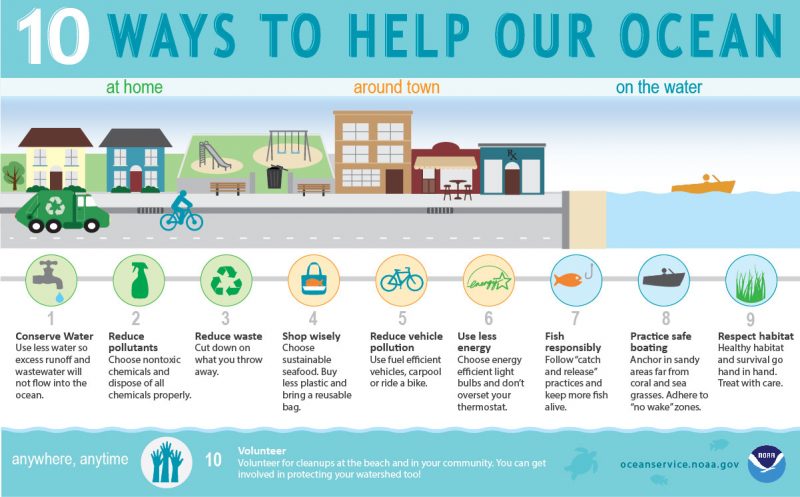
Photo credits: NOAA (National Oceanic and Atmospheric Association)
During Winter Term 2018, students in the class entitled “Leelanau Revealed” explored the history and people of the Leelanau peninsula. Students practiced being real life historians while going off campus, taking advantage of our local resources, and using Journalism skills like interviewing and researching. They were able to visit historic sites, speak with local historians, peruse Maritime museums, and scour archives. Their final project was to create a book containing all that they learned during the course.
From narrative to poetry to locals interviewed by our student writers, this book we call Leelanau Revealed is a true collection of the collaborative minds our school embodies.
CELEBRATE THE WRITERS FROM OUR WINTER TERM PROJECT BY ORDERING A COPY TODAY!
To order a copy, please send an email to:
jparker@leelanau.org Subject Line: Leelanau Revealed
We will have a special book signing event for families and students at the Leadership Recognition Ceremony, part of Graduation Weekend, on Thursday, May 31, at 7 pm. Copies ordered before March 24th will receive a barcode for a creative audio reading of the student voices. What are you waiting for? These writers have a lot to share about Leelanau that makes us…well…us!
Book cost $20 per copy ordered before March 24th.
Book cost per copy at signing will be $28.
The team of writers/editors/design layout consisted of Kaz McCue, Tanya Firestone, Matthew Stewart, Xavier Harrell, Thomas Chilton, and Risa Trauner.
It seems like everything is about technology these days. Most things we do throughout the day have a tech option and sometimes it doesn’t even seem like an option – using tech is just what we do.
When it comes to learning and our ability to assimilate written information, digital text may seem like the obvious winner. It’s portable, accessible, less expensive (assuming you have a device), and just down right handy. However, when considering that many people’s comprehension levels vary based on authentically interacting with a text, does digital really stand up to print?
The answer really depends on how interactive is the digital text? When addressing what books to order or why digital may be a better fit for a particular assignment, teachers must continually ask themselves “what is the purpose of the reading I am asking students to respond to comprehend?”
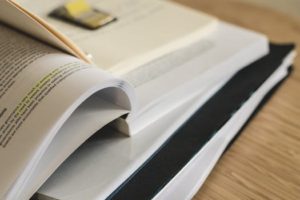 The one measure that is extremely important for writing skills is proofing and research does show that when students read aloud and respond to written text they catch proofing errors more readily and can increase their writing abilities. So, printing out a hard copy and proofing it before just hitting send, can make a big difference.
The one measure that is extremely important for writing skills is proofing and research does show that when students read aloud and respond to written text they catch proofing errors more readily and can increase their writing abilities. So, printing out a hard copy and proofing it before just hitting send, can make a big difference.
According to Leelanau School English teacher, Tanya Firestone, “Slowing the process is important in both reading and writing, since so much of reading and writing skills form around the act of deliberation. Being deliberate- concise takes time to process.”
However, we need to be realists and understand that teaching and learning are not about just one assignment, one book , or one class. Teachers are preparing students for college and for life after college.
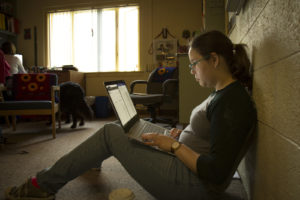 Becca Dymond, Director of the Leelanau School Learning Commons, put it this way: “It’s not really about which is better: print or digital. We need to prepare our students to be literate readers of both print and digital texts in college. The digital text necessitates our attention paid to another important literacy skill. Like so many other student skills, many [students] have not received explicit support and practice for their digital literacy skills. Just like we can’t assume they know how to read a textbook, we can’t assume [students] know how to navigate a digital text.”
Becca Dymond, Director of the Leelanau School Learning Commons, put it this way: “It’s not really about which is better: print or digital. We need to prepare our students to be literate readers of both print and digital texts in college. The digital text necessitates our attention paid to another important literacy skill. Like so many other student skills, many [students] have not received explicit support and practice for their digital literacy skills. Just like we can’t assume they know how to read a textbook, we can’t assume [students] know how to navigate a digital text.”
The takeaway is that students need the skills to use both digital and print texts, but they also need the self-awareness about when one might be more effective for them to use over the other. If they can gain the dexterity to utilize both types, while also recognizing when one form will better lead to their success, than education has truly been attained.
Further Reading:
Mindshift – A Textbook Dilemma: Digital or Paper?
The Atlantic – Is Google Making Us Stupid?
ThoughtCo. – How To Proofread Effectively

